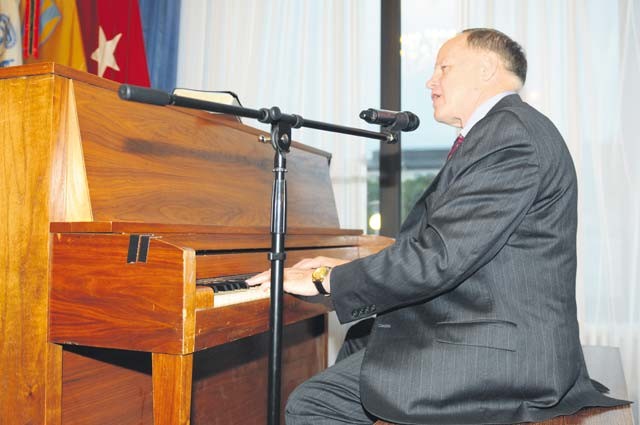
The 22nd Army chief of chaplains gathered with key leaders and military personnel across the KMC for an energetic, festive and musical Rheinland-Pfalz community prayer breakfast Oct. 21 at the Ramstein Officers’ Club.
Retired Maj. Gen. Douglas L. Carver, who currently serves as the executive director of chaplaincy services for the North American Mission Board, joined leaders, Soldiers, Airmen and civilians for prayer, song and hearty cuisine.
Maj. Gen. Duane A. Gamble, commanding general of the 21st Theater Sustainment Command, celebrated diversity in faith during his opening remarks.
“There are a lot of different faiths represented in the military services, and we don’t all think exactly alike,” Gamble said.
Gamble continued to highlight the value of diversity and contrast in faiths.
“In fact, some of our beliefs contradict each other in terms of the spirituality of life,” he said. “It’s diverse. It’s complicated. And I think that’s pretty cool!”
The prayer breakfast is a traditional function conducted in communities throughout the military. At this event, community members from various faiths and congregations gathered for a breakfast, followed by fellowship, prayer and a celebration of the role of faith in the military services.
A series of chaplains followed the commanding general and preceded the guest speaker to the podium, offering prayers, reflections and good humor. The event also featured musical performances by the U.S. Army Europe Band and several community members. Carver himself took to the piano to play and sing a spiritual song before giving his remarks.
Carver became the first Southern Baptist in more than a half century to serve as Army chief of chaplains when he assumed the role in 2007. He held the position until his retirement in 2011 after 38 years of military service, and it wasn’t Carver’s first trip to Germany. He served previously as V Corps and USAREUR command chaplain.
The topics Carver discussed included the importance of faith to Soldiers and Airmen in combat environments, the role faith-based values play in the services, and ways in which leaders can discuss topics of faith without interfering with religious liberty.
“Regardless of your rank, I don’t see any problem with you as a leader, when asked and when appropriate, sharing what it is that gives you hope, that gets you through to that next challenge in life,” Carver said. “I’m thinking now of my former corps commander. Whether he was speaking in chapel or in the streets of Baghdad, he would always close with a portion of Psalm 144: ‘Praise be to the Lord, my Rock, who trains my hands for war, my fingers for battle.’”


